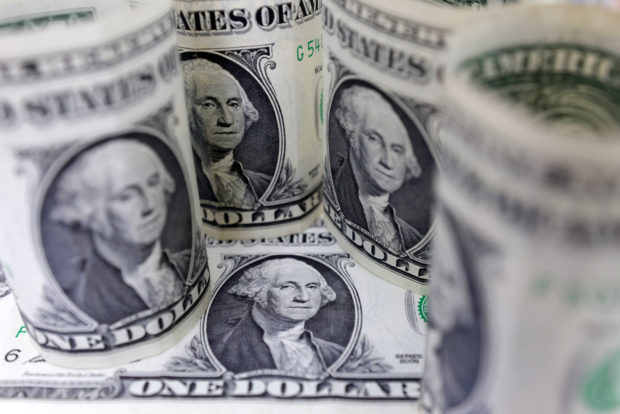
U.S. Dollar banknotes are seen in this illustration taken July 17, 2022. REUTERS/Dado Ruvic/Illustration
The country’s exports contracted in August on weakening global demand while the import bill surged due mainly to expensive oil and food products, causing the trade deficit to bloat by 81.3 percent to a new monthly record of $6 billion.
Preliminary data of the Philippine Statistics Authority show that two-way traffic of goods in August was valued at $18.82 billion, an increase of 15 percent from $16.39 billion in the same month in 2021.
Of the total trade value in August, imports accounted for about two-thirds, which means that the country spent $2 on imports for every dollar earned from exports.
Nicholas Mapa, senior Philippines economist at ING Bank, said exports decreased in August as demand weakened while imports increased amid high prices and a resurgence of the domestic economy—meaning higher demand for goods from abroad.
Michael Ricafort, chief economist at the Rizal Commercial Banking Corp. (RCBC), added that the record trade deficit may have fundamentally contributed to the peso weakening to new records recently.
In August, the peso depreciated by 83.5 centavos, starting the month at 55.31:$1 and ending at 56.145:$1
In August, imports swelled by 26 percent to $12.41 billion, faster than the growth rate of 22.2 percent in July but slower than the 28.3 percent recorded in August last year.
Electronic products were the top import with a value of $2.89 billion or 23.3 percent of the total bill in August.
This was followed by mineral fuels, lubricants and related materials, valued at $1.93 billion (15.6 percent of total); and transport equipment, which amounted to $948.12 million (7.6 percent).
Export receipts, on the other hand, decreased by 2 percent to $6.41 billion, slower than the 4-percent decrease in July but a reversal from the 18.9-percent jump in August 2021.
Electronic products remained the biggest export earner, with $3.66 billion or 57 percent of total.
From January to August, the trade deficit was pegged at $41.81 billion, expanding by 69 percent from $24.77 billion in the same period of 2021.
Eight-month imports beefed up by 26 percent to $92.97 billion this year from $73.77 billion last year.
January-August export earnings, on the other hand, inched up by a measly 4.4 percent to $51.16 billion in 2022 from $49 billion in 2021.
Ricafort said the drop in crude oil prices could help ease the country’s oil import bill as well as help ease inflationary pressures in the coming months.
“Global crude oil prices already eased to the lowest in seven to eight months recently or even lower since